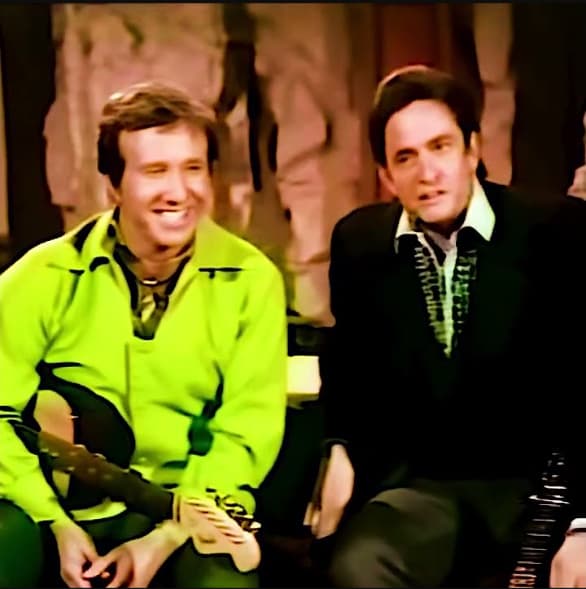
An introspective ballad on the inevitability of death and a final, mournful farewell.
A hushed reverence falls over the studio audience. The year is 1969, a time of seismic shifts in society, yet here, on The Johnny Cash Show, a timeless tale is about to be told. The man in black himself, Johnny Cash, stands beside another titan of the genre, Marty Robbins. Two legends, two voices, one haunting story. What they are about to perform isn’t a new hit or a pop-chart sensation; it’s a song so old its origins are lost to the mists of time, a ballad that has been sung around campfires and in dusty saloons for generations: “Streets of Laredo.”
This isn’t the version that became a staple of folk and country music—a lonely cowboy’s lament. This is a special moment, captured for a television audience, a unique collaboration that elevates the song’s somber tone. While not a chart-topping single in this particular rendition, the original versions of “The Streets of Laredo” and its precursor, “The Unfortunate Rake,” have permeated the folk music landscape for centuries. The song’s melody can be traced back to the 18th-century Irish folk tune “The Ballad of ‘The Bard of Armagh’,” which was later adapted into the Christian hymn “Gilderoy.” This rich history imbues the song with a profound sense of weight and tradition.
The story behind “Streets of Laredo” is a tragic, yet deeply human one. It follows the final moments of a young cowboy, a “rambler” with a troubled past, as he lies dying from a gunshot wound on the dusty streets of Laredo, Texas. The narrative is a first-person confession, a final reflection on a life lived hard and fast. He admits his mistakes, his foolishness, and his descent into a life of gambling and drinking. His final wish is a simple one: for his companions to wrap him in a white linen cloth, bury him in a “box of polished mahogany,” and “tell his dear mother he’s gone on to glory.” It’s a poignant request that speaks to a universal desire for a dignified end, despite a less-than-dignified life.
What makes this performance on The Johnny Cash Show so exceptional is the interplay between Cash and Robbins. Cash’s deep, resonant baritone, weathered by a lifetime of hardship and redemption, perfectly embodies the weary wisdom of an old soul. Robbins’s smoother, more melodic voice adds a layer of sorrowful beauty, a lament that echoes the young cowboy’s dying wish. Together, they create a dialogue of regret and acceptance. The song isn’t just about dying; it’s about coming to terms with one’s past, seeking a semblance of peace before the end. For many, this performance became a touchstone, a moment of quiet reflection in a noisy world. It reminds us that no matter how we live, we all face the same final curtain, and a a yearning for peace at the end of our lives is a universal constant. It’s a powerful and timeless message that resonates just as deeply today as it did more than five decades ago.
Fun Fact: Although the song is most often associated with the American West, its origins trace back to a much older English folk ballad titled “The Unfortunate Rake.” This earlier song told a similar tale of a young man dying of a venereal disease in London, a cautionary tale for the time. The transition from the streets of London to the streets of Laredo reflects how folk songs can migrate and adapt to different cultures, changing their settings while retaining their core themes of mortality and redemption.